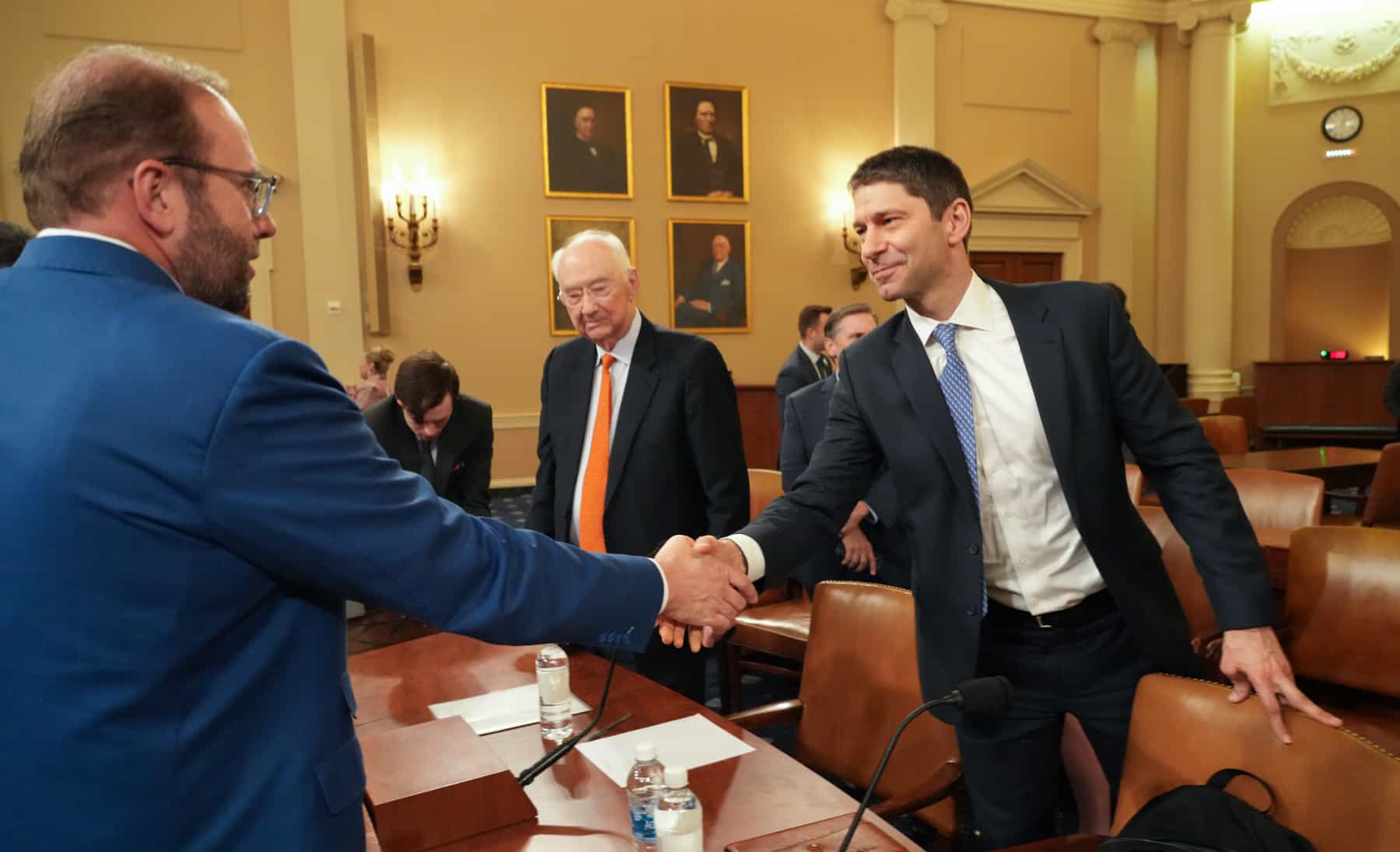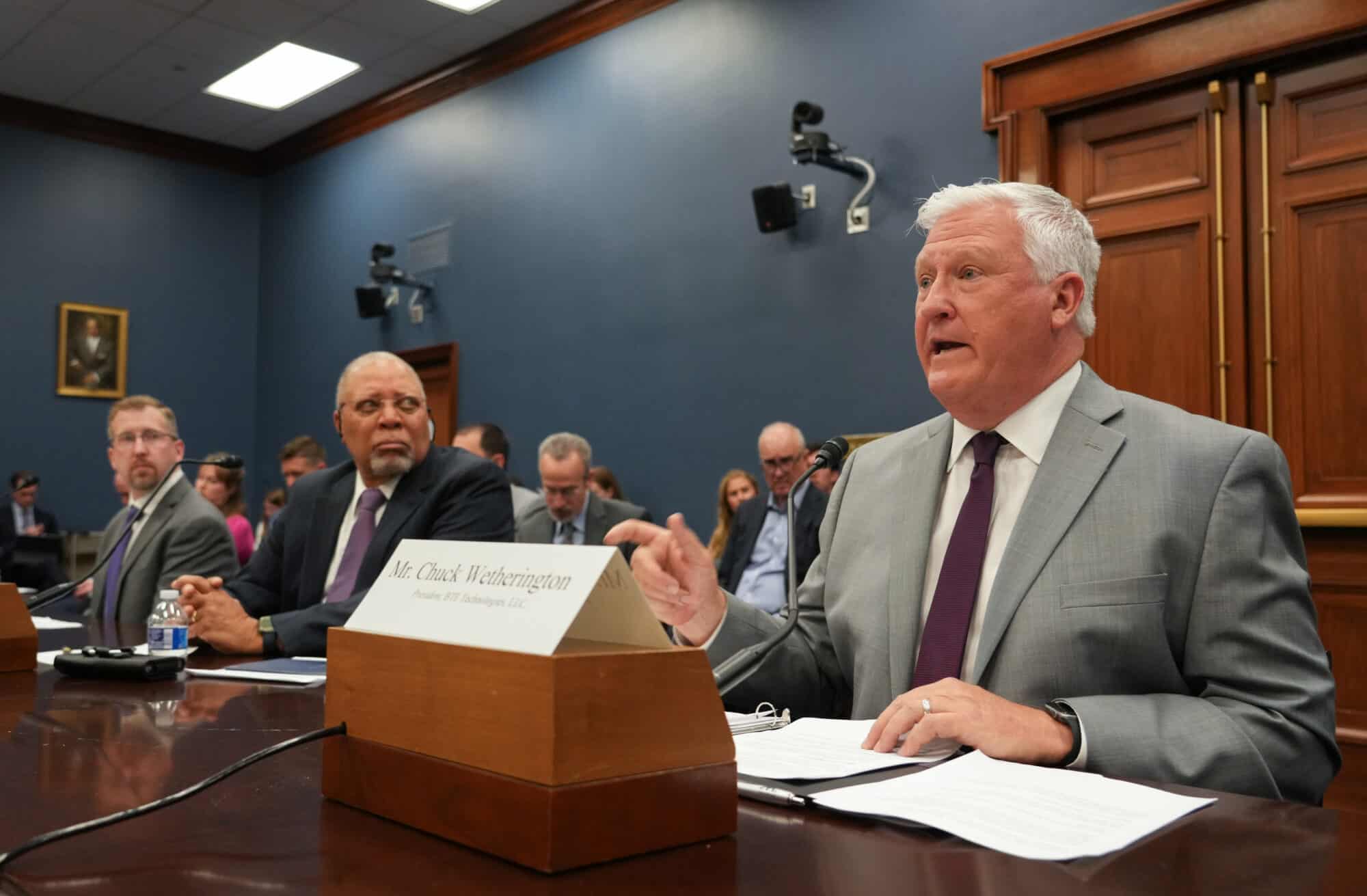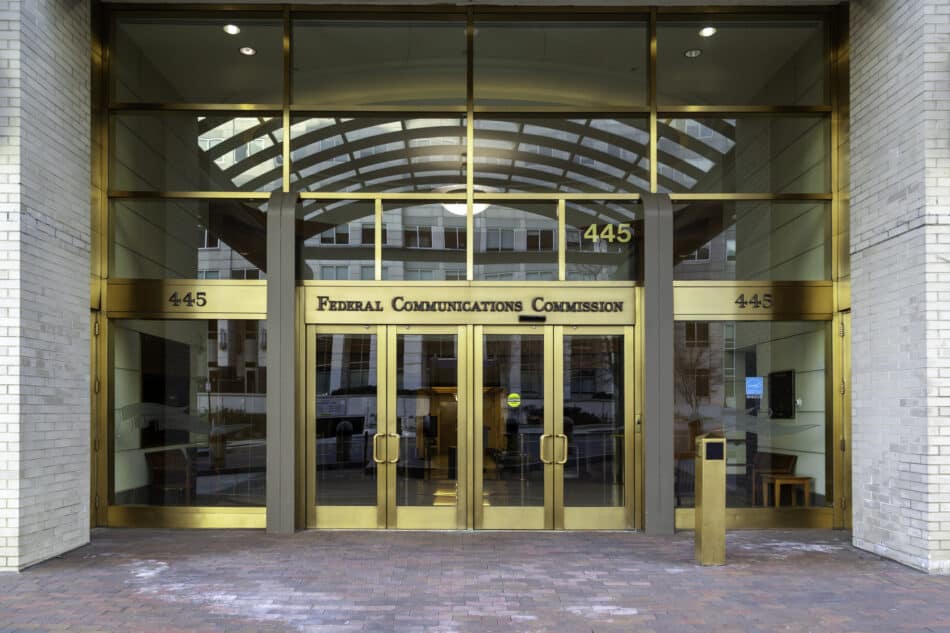Manufacturers: DOL Overtime Rule Will Exacerbate Workforce Crisis
Washington, D.C. – Following the release of the Department of Labor’s Wage and Hour Division rule concerning updates to the overtime regulations, National Association of Manufacturers Managing Vice President of Policy Chris Netram released the following statement:
“Quarter after quarter, manufacturers cite workforce issues, such as attracting and retaining skilled employees, as their biggest business challenge. Yet today’s rule places new constraints on employers, reduces flexibility for the workers who will be reclassified and may force companies to make painful choices that limit both job creation and growth opportunities available to employees. In addition, this latest regulatory hurdle will complicate manufacturers’ efforts to fill the millions of jobs our industry is projected to create within a decade.”
-NAM-
The National Association of Manufacturers is the largest manufacturing association in the United States, representing small and large manufacturers in every industrial sector and in all 50 states. Manufacturing employs nearly 13 million men and women, contributes $2.89 trillion to the U.S. economy annually and accounts for 53% of private-sector research and development. The NAM is the powerful voice of the manufacturing community and the leading advocate for a policy agenda that helps manufacturers compete in the global economy and create jobs across the United States. For more information about the NAM or to follow us on Twitter and Facebook, please visit www.nam.org.
Proposed “Right-to-Repair” Exemptions Would Hurt Manufacturers, Consumers

The NAM testified before the U.S. Copyright Office last week, explaining how two proposed exemptions from copyright protections would weaken manufacturers’ intellectual property rights, do significant harm to their businesses and potentially endanger consumers.
What’s going on: The Copyright Office is considering whether to recommend two exemptions from the Digital Millennium Copyright Act that would allow users to circumvent measures protecting copyrighted content.
- One proposal was designed to allow the so-called “right-to-repair” by enabling access to operational data (including diagnostic and telematics data) from automobiles, agricultural vehicles, marine vessels and more. The other is focused on industrial equipment.
NAM speaks out: “The basis of the so-called ‘right-to-repair’ movement hinges on the false notion that owners do not have the ability to repair their own equipment,” NAM Vice President of Domestic Policy Charles Crain said at the recent hearing. “The truth, however, is that the majority of [original equipment manufacturers] already provide a wide range of resources and tools that allow users—and third-party repair businesses—to maintain, diagnose and repair products.”
- The NAM previously submitted comments urging the Copyright Office not to adopt the proposed exemptions.
Why it’s important: “These exemptions would undermine manufacturers’ IP rights in service of right-to-repair—and the record does not support their adoption,” Crain continued.
- The exemptions are too broad and inadequately defined, and their proponents have “failed to show that users will be adversely affected absent the ability to circumvent [copyright law].”
- What’s more, the exemptions “would expose proprietary information to public consumption and use, likely endangering consumers and allowing for unlawful modifications of government-mandated safety and emissions limits.”
The last word: “In short, right-to-repair is a solution in search of a problem,” Crain said.
Manufacturers: Unprecedented Use of CERCLA Authority Will Hamper President’s Manufacturing Vision
Washington, D.C. – Following the release of the Environmental Protection Agency’s rule designating perfluorooctane sulfonic acid, also known as PFOS, and perfluorooctanoic acid, also known as PFOA, as hazardous substances under the Comprehensive Environmental Response, Compensation and Liability Act, National Association of Manufacturers Managing Vice President of Policy Chris Netram released the following statement:
“Manufacturers support efforts to mitigate harmful chemicals from impacting our environment and the health of our nation, but this unprecedented use of CERCLA authority by the EPA will only hamper President Biden’s vision of growing the manufacturing sector in the U.S. The unique and unmatched chemical bond of these compounds means that there are no existing replacements for the critical products they make up.
“The NAM is not opposed to commonsense regulations of PFAS chemicals, and manufacturers are committed to environmental stewardship, while recognizing in many cases we will need to continue to use these chemicals for the foreseeable future. However, designating these compounds as hazardous substances is a blunt, overreaching decision that will make it harder for our industry to create innovative products and jobs.”
-NAM-
The National Association of Manufacturers is the largest manufacturing association in the United States, representing small and large manufacturers in every industrial sector and in all 50 states. Manufacturing employs nearly 13 million men and women, contributes $2.89 trillion to the U.S. economy annually and accounts for 53% of private-sector research and development. The NAM is the powerful voice of the manufacturing community and the leading advocate for a policy agenda that helps manufacturers compete in the global economy and create jobs across the United States. For more information about the NAM or to follow us on Twitter and Facebook, please visit www.nam.org.
Manufacturer to Congress: Support the American Dream

Austin Ramirez is living proof that the American dream still works—when the right policies are in place.
The president and CEO of family-owned Husco, a Waukesha, Wisconsin-based, hydraulic and electromechanical control systems manufacturer, told lawmakers Thursday that his family was able to found and expand a successful business in large part thanks to pro-growth tax policies.
All in the family: “My dad came to the states from Puerto Rico as a 6-year-old and grew up to earn a master’s in aerospace engineering and a Harvard M.B.A.,” Ramirez said at a hearing of the House Ways and Means Committee.
- “In short, our story is the embodiment of the American dream. But it was made possible by American reality—the laws that all of you write in this very room have a direct, concrete impact on our ability to succeed.”
Impact of expirations: The 2017 Tax Cuts and Jobs Act made it possible for manufacturers across the country to invest in new equipment, pay for renovations and expansions, hire much-needed workers and more. It was “unquestionably a success,” according to Ramirez.
- But the 2022 and 2023 expiration of three manufacturing-critical tax provisions in the legislation—immediate expensing for domestic research and development, enhanced interest deductibility and full expensing, which the NAM has been urging legislators to reinstate—has already hit Ramirez’s business, and hard.
- “Husco now has to amortize our R&D expenses, making it far more costly for us to design customized, proprietary products for our customers,” Ramirez went on. “Debt financing is now more expensive … [a]nd we can no longer immediately expense the full cost of our capital equipment purchases, forcing [us] to make smaller investments, spread out over many years.”
More tax increases coming: Ramirez also highlighted the TCJA provisions that are set to expire next year and the economic damage the expiration would cause.
- “At the end of 2025, individual tax rates will increase and individual tax brackets will decrease,” he said. “These changes mean that pass-through businesses like Husco will have more of our income subject to a higher rate of tax. At the same time, the pass-through deduction will expire completely, doubling down on the tax hikes that we face. … [A]llowing tax reform to sunset will undermine much of the progress we’ve made since 2017.”
What must happen: Ramirez thanked the committee for passing the Tax Relief for American Families and Workers Act—and reminded them of work still to be done.
- “Congress must act now to restore expired provisions—and be prepared to act in 2025 to forestall even more damaging tax increases. Only by preserving the Tax Cuts and Jobs Act can Congress ensure that uniquely America stories like Husco remain possible.”
NAM: EPA’s National PFAS Drinking Water Standard Threatens Manufacturing

Municipal water systems will soon be required to remove six types of per- and polyfluoroalkyl substances, or PFAS, from drinking water, The New York Times (subscription) reports.
- But the move could backfire and have adverse effects on manufacturers, the NAM said Thursday.
What’s going on: The Environmental Protection Agency on Wednesday announced the first-ever national rule limiting PFAS “to near-zero levels.”
- PFAS are compounds that have been used for decades due to their rare ability to douse fires and resist grease, corrosion and stains. They’re found in everything from semiconductors to medical devices and renewable-energy production equipment.
- But under the new mandate water systems across the U.S. will have three years to monitor the chemicals and a further two years to put into place technology to reduce the compounds’ levels in the water.
- The utilities “would be required to notify the public and reduce contamination if levels exceeded the new standard of 4 parts per trillion for [PFOA and PFOS]. Previously, the agency had advised that drinking water contain no more than 70 parts per trillion of the chemicals.”
The background: The rule comes just over a year after the EPA proposed the first federal limits on two PFAS chemicals, known as PFOA and PFOS.
The funding: The 2021 Bipartisan Infrastructure Law set aside $9 billion to help communities with PFAS removal. The government will make $1 billion of it available to states and territories to help defray the cost of testing and treatment over the next few years.
Higher prices, less security: The new standard is wholly infeasible, NAM Managing Vice President of Policy Chris Netram said, and will lead to cost increases throughout the supply chain and make our national defense more difficult.
- “In many instances, there is no viable alternative for these chemicals, and companies may be forced to change plans dramatically” to comply with the new rule, he said. “The severity of the proposed regulations will mean higher prices for everything—community water and waste systems, medical treatments and electronics. More alarming, the regulations will make it more difficult to produce the equipment our military needs to defend our nation.”
What we’re doing: The NAM is weighing legal options for reversing the final rule, according to Netram.
Manufacturers: EPA Chemical Decision Will Directly Threaten Our Ability to Innovate, Create Jobs and Defend Our Nation
Washington, D.C. – Following the release of the Environmental Protection Agency’s rulemaking surrounding the monitoring for per- and poly-fluoroalkyl substances (PFAS) in municipal water systems, National Association of Manufacturers Managing Vice President of Policy Chris Netram released the following statement:
“Manufacturers support efforts to remove potentially harmful chemicals from our water systems, but again the EPA has set standards that are not feasible and will directly threaten manufacturers’ ability to invest, innovate and create jobs in America. In many instances, there is no viable alternative for these chemicals, and companies may be forced to change plans dramatically to grow facilities and hire new workers.
“The severity of the proposed regulations will mean higher prices for everything—community water and waste systems, medical treatments and electronics. More alarming, the regulations will make it more difficult to produce the equipment our military needs to defend our nation. The final rule requires water systems to monitor, sample and treat at near zero levels, which will increase costs throughout the supply chain. We are looking at all options to reverse this harmful decision and to slow the regulatory onslaught that directly undermines the president’s efforts to grow manufacturing in the United States.”
-NAM-
The National Association of Manufacturers is the largest manufacturing association in the United States, representing small and large manufacturers in every industrial sector and in all 50 states. Manufacturing employs nearly 13 million men and women, contributes $2.89 trillion to the U.S. economy annually and accounts for 53% of private-sector research and development. The NAM is the powerful voice of the manufacturing community and the leading advocate for a policy agenda that helps manufacturers compete in the global economy and create jobs across the United States. For more information about the NAM or to follow us on Twitter and Facebook, please visit www.nam.org.
Small Manufacturer: Industry Needs Tax Consistency

Small manufacturers need one thing from Congress, BTE Technologies President Chuck Wetherington told lawmakers on Wednesday: a consistent, pro-growth tax code.
What’s going on: Speaking at a hearing of the House Committee on Small Business, Wetherington told lawmakers how increased taxes and frequent changes to the tax code have harmed his company, a 40-employee medical device manufacturer in Hanover, Maryland.
- By passing the 2017 Tax Cuts and Jobs Act, “Congress was able to take a stale, outdated tax code and update key provisions to reduce taxes on small manufacturers,” Wetherington said. That legislation “drove a new wave of economic activity and industrial expansion. BTE, and many of our peers in the industry, experienced historic growth in the years between tax reform and the pandemic.”
- But the expiration in 2022 and 2023 of three crucial tax provisions—immediate expensing for domestic R&D, enhanced interest deductibility and full expensing, each of which the NAM is leading the charge to reinstate—is now hurting BTE and other businesses in its supply chain.
- And more tax hikes are on the horizon, with tax reform’s small business incentives—including the 20% pass-through deduction—set to expire at the end of 2025.
Less capital, fewer projects: “Bringing a medical device to market is extremely risky and takes years and millions of dollars of investment,” Wetherington continued. “But now, BTE cannot immediately expense those costs—reducing the working capital I have available to invest in my business and my employees … [and] delay[ing] projects to redesign and improve BTE’s flagship products.”
- As a direct result of the changes, BTE has had to put off expansions that would have allowed it to expand its workforce by 50%.
- And because most of BTE’s suppliers are pass-through businesses (entities in which profits pass through to the owner and are taxed at the individual rate), BTE will see even higher operating costs at the end of 2025, when tax rates are scheduled to increase and the pass-through deduction is set to expire.
What must be done—now: The Senate must pass the House-passed Tax Relief for American Families and Workers Act, which would reinstate the three expired provisions that are so critical to manufacturers. And Congress must commit to preventing the economic damage from the scheduled tax increases.
- “We deserve a tax code that promotes innovation and demonstrates to the rest of the world what our values will be for the next decade and beyond,” Wetherington said.
Manufacturers: Complex EPA Rule Will Disrupt Manufacturing Supply Chain
Washington, D.C. – Following the release of the Environmental Protection Agency’s recent rulemaking regarding limitations on emissions of ethylene oxide, National Association of Manufacturers Managing Vice President of Policy Chris Netram released the following statement:
“While the EPA listened to some of manufacturers’ concerns, such as allowing more time for companies throughout the supply chain to assess the impact on their operations, the rulemaking adds to the ongoing regulatory onslaught our industry has been facing.
“The agency’s decision to maintain the fenceline monitoring schedule at every five days for ethylene oxide creates a significant compliance burden for manufacturers, and the rule’s mandate that operations are completely shut down when small repairs are required will impact manufacturers’ ability to maintain consistent operations. The potential disruption to supply chains could make it more difficult to create jobs in communities across the country.”
-NAM-
The National Association of Manufacturers is the largest manufacturing association in the United States, representing small and large manufacturers in every industrial sector and in all 50 states. Manufacturing employs nearly 13 million men and women, contributes $2.89 trillion to the U.S. economy annually and accounts for 53% of private-sector research and development. The NAM is the powerful voice of the manufacturing community and the leading advocate for a policy agenda that helps manufacturers compete in the global economy and create jobs across the United States. For more information about the NAM or to follow us on Twitter and Facebook, please visit www.nam.org.
Manufacturers Bracing for FCC Vote on Broadband Regulation Rule

The Federal Communications Commission is set for an April 25 vote to bring back “net neutrality,” aiming to reinstate a national regulatory framework for broadband internet services, Fox Business reports. The NAM is speaking out against it.
What is it: “The Biden administration’s rule would regulate broadband services as an essential resource under Title II of the Communications Act.’’
How did we get here: “In 2015, the FCC adopted the Obama administration’s [net] neutrality rules, known as the Open Internet Order. The rules survived a legal challenge with a favorable ruling by a federal appeals court in 2016.”
- In 2017, the Trump administration rolled back broadband regulation with a regulation known as the Restoring Internet Freedom rule, citing it as an impediment to innovation and investment by internet service providers. This decision held up against a legal challenge.
- By 2021, President Biden’s executive order suggested reviving Obama-era broadband rules. With Democrats leading the FCC by October 2023, a formal process began, setting the stage for a conclusive vote.
What would happen next: The NAM sent detailed feedback to the FCC last December, warning that reinstating broadband regulation “will lead to a slowdown in innovation and investment.”
- The NAM’s feedback pointed to the negative impact of the Obama administration’s previous attempt to implement the policy: “In 2015, the last time the FCC sought to regulate broadband under Title II, annual industry capex fell by half a billion dollars.”
- The FCC’s decision exceeds its authority and could also be subject to litigation: “Congress has not explicitly given the commission the authority to regulate broadband and reclassify it in this way; therefore, the FCC lacks authority to do so.”
Our take: “As with the other elements of the regulatory onslaught out of Washington these past few years, this is yet another solution in search of a problem, because we already have an open and fair internet,” said NAM Senior Director of Technology Policy Franck Journoud. “As we’ve warned, this will regulate broadband as if it were the same as rotary telephone service, which would slow innovation. The commission really is doing nothing to answer the question of ‘why’ this policy should be brought back.”
- The NAM has long opposed broadband regulation and went to court to support the FCC’s 2017 decision to repeal the rule. As NAM Chief Legal Officer Linda Kelly said, “Internet-driven technology is at the heart of modern manufacturing, and the FCC’s decision to repeal the onerous 2015 net neutrality rule was a victory for the competitiveness of manufacturers in America.”
The NAM will closely follow the FCC’s latest vote on net neutrality and is prepared to oppose any decision to restore this outdated policy.
TSMC to Receive Up to $6.6 Billion in CHIPS Funding

The Biden administration on Monday announced that TSMC’s Arizona subsidiary will receive up to $6.6 billion in grants from the 2022 CHIPS and Science Act, The New York Times reports. The announcement is the latest move by the Biden administration to make the United States a leading producer of cutting-edge semiconductor technology.
What’s going on: The funding “will help support the construction of TSMC’s first major U.S. hub, in Phoenix. The company has already committed to building two plants at the site and will use some of the grant money to build a third factory in Phoenix, U.S. officials said on Sunday.”
- The company will “increase its total investments in the United States to more than $65 billion, up from $40 billion.”
- “TSMC’s investment is expected to create about 6,000 direct manufacturing jobs and more than 20,000 construction jobs, federal officials said.”
- In addition to the grants, the federal government is also offering TSMC up to $5 billion in loans.
Impact on U.S. chip production: “With projects such as TSMC’s, the U.S. is on track to make about 20% of the world’s cutting-edge chips by 2030, the Commerce Department said. It called the project the largest foreign direct investment in a new project in U.S. history,” reports The Wall Street Journal (subscription).
- Earlier this year, the Biden administration announced major chips funding awards for Intel and GlobalFoundries.
The NAM’s reaction: “Today’s announcement from TSMC and @CommerceGov makes America stronger,” the NAM wrote in a social post Monday. “The NAM-championed CHIPS and Science Act continues to spur new investments in cutting-edge semiconductor technology that is essential to advancing U.S. economic competitiveness.”
